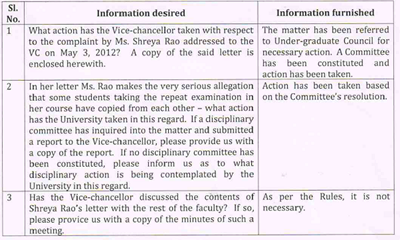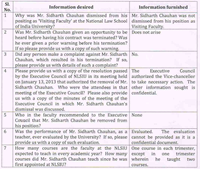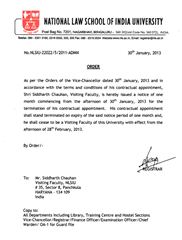NLSIU Bangalore’s administration side-stepped Right to Information (RTI) requests seeking transparency in its student-grading system, information on measures taken to curb cheating in exams, and the reasons for the dismissal of former visiting faculty Sidharth Chauhan.
At the behest of NLSIU alumnus Prashant Reddy, NUJS Kolkata 2013 graduate Sai Vinod filed RTIs at the law school last month for details on the rate and manner in which NLSIU students who failed certain papers, allegedly passed after re-evaluation. He also filed an RTI asking for the factors playing a role in Chauhan’s dismissal.
Vinod also asked whether administrative action was taken to investigate faculty member Shreya Rao’s allegations regarding the misuse of the re-evaluation procedure and specific allegations of cheating during exams.
However, NLSIU’s Central Public Information Officer (CPIO) and officiating registrar K Ashwatha Reddy’s replies to the RTIs shed little light on the queries.
Inflated grades? Self-explanatory

In 2009 NLSIU had adopted a re-evaluation procedure in response to demands of the student body, which comprised of a large number of students repeatedly failing certain subjects. It was felt at the time that some teachers were being unduly harsh in their evaluation of exam papers.
Chauhan, who has since joined Nalsar Hyderabad as an assistant professor, commented via email to Legally India that re-evaluation had been devised as an exception rather than the norm. “Over the last four academic years (i.e. July 2009-present), we have heard of several instances where the present vice chancellor has literally changed hundreds of grades awarded in numerous subjects.
“In most of these cases, students who have failed subjects by considerable margins have been given passing grades, simply by invoking this particular regulation that provides for re-evaluation, despite course teachers repeatedly objecting to such untrammelled use of the rule. Not only are such re-evaluations completely arbitrary and unfair to hardworking students, it also undermines the morale amongst the teachers who are now second-guessed.”
“Normally, the re-evaluations are done en-masse, supposedly by outside faculty, and the results are released in the form of notifications,” he added. Legally India has seen a copy of one such notification from 27 February 2013.
Vinod’s RTI asked for the total number of re-evaluation notifications issued at the law school, the total number of students who’ve had their grades changed, the number of requests that were declined and the details of the re-evaluators.
However, NLSIU’s response stated:
“No requirement for Notification under Regulation V(7) of the Academic year and Examination Regulations… Vice-chancellor did not change any grade. The names of the evaluators cannot be given as it is strictly confidential.”
The response added that no requests for re-evaluation had been denied and, referring to the above “self-explanatory” response, copies of notifications could not be supplied.
In addition, the response stated that 38 faculty meetings were held in the current VC’s Prof Venkat Rao’s tenure, which began on 11 May 2009.
Chauhan, who had lamented the lack of faculty meetings at the law school, as previously reported, commented: “Even if 38 meetings have actually been held over the past four academic years, it demonstrates a marked decline from the previous practice at the institution. Under the previous Vice-Chancellors, a meeting of the entire faculty would usually be held every week during the instructional periods.”
No evaluation & leaked exams? ‘Action taken’

NLSIU faculty Shreya Rao had written to NLSIU VC Venkata Rao on 3 May 2013. [Read full letter here (opens in new window)]
“On September 19, 2012, I had written to you … [about] the unusual levels of disinterest within the batch, which I was informed was on account of the confidence the students had that they would be able to approach you to have their exam papers favourably re-evaluated. I requested the support of the institution in ensuring that the students do not take the easy way out and specified that I would be happy to defend my evaluation for each paper if required […]”
“My second email was dated January 15, 2013 and was in relation to three repeat exam papers which were verbatim copies of each other. […] I requested you to look into whether the paper was leaked prior to the exam or whether there was a failure at the invigilator’s level.”
The CPIO’s response to Vinod’s RTI stated that the “matter has been referred to under-graduate council for necessary action. A committee has been constituted and action has been taken”. In response to asking what disciplinary action was being “contemplated”, the CPIO re-stated that “action has been taken based on the Committee’s resolutions”.
Chauhan ‘not dismissed’

On 1 February Legally India first reported that Chauhan had been dismissed the day before from his visiting faculty position at NLSIU – little over a month after he wrote an open email to the VC criticising his non-consultative manner of imposing a 9pm ban on opening the law school gates.
On 1 July the law school replied to Vinod’s RTI asking why Chauhan was dismissed, stating: “Mr Sidharth Chauhan was not dismissed from his position as visiting faculty.” An opportunity for Chauhan to have been heard before termination of his contract, “does not arise”, according to the response (see image, left).
However, a later response stated that “the executive council authorised the vice chancellor to take necessary action [with respect to Chauhan]. The other information sought is confidential”. Similarly, copies of Chauhan’s performance evaluations were a “confidential document”.
On 31 January Chauhan had been sent one-month’s notice of termination of his contractual employment, which was signed by NLSIU’s registrar (see copy, right).
Grounds for appeal?
Since the RTI appellate authority at NLSIU is the VC himself, and most questions in the RTIs are in respect of the VC’s decisions, Vinod will ask the VC to nominate a senior faculty member or an executive council member at the law school to act as the RTI appellate authority.
threads most popular
thread most upvoted
comment newest
first oldest
first
An equal number of faculty members have been hired FYI. Check the website, in case you did not, before you made that lame comment.
i can name 4:
1. awful infrastructure: fees hiked but no money spent
2. pathetic faculty (in fact the website lists former profs who have left)
3. no action against slapgate prof
4. zero accountability
Bottom line is, sure, we'd love to write more about such things but we actually need some hard evidence or strong leads, rather than doing a story saying, btw guys, a student has complained that infrastructure at NUJS is awful did you know?
We'd love to go digging but there are only so many holes we can dig at one time. If you'd like us to follow up something specific please let us know by expressing more than general dissatisfaction, either in the comments, or preferably, if the evidence is more detailed and requires investigation, directly via email. Your identity will be held in the strictest confidence of course, as always.
Best wishes,
Kian
Take comments from Dr. Vishwas Devaiah or various other faculty members who have gone on 2 year leaves or quit to know more about this attitude.
In short NUJS is currently functioning just like the illustrious West Bengal government and may suffer the same fate as the state unless systematic changes are made.
Quoting kianganz:
1. The [...] incident where she alleged that she was sexually harassed by [...] ...and the VC is doing nothing to protect her interest. In fact, she had complained to him 4 times earlier and he did absolutely nothing! As head of an institution teaching gender justice, this is absolutely shocking! He is batting for [...] and is now pressuring [...] to withdraw the complaint! An enquiry committee was constituted more than a month ago to look into [...] complaint, but not a single sitting so far! [...] was the VC's closest lackey and together with him, they manipulated all University processes to centralise more power. From a transparent administration, we now have one of the most opaque dealings going on. Rules are suddenly changed at the VCs behest without any consultation. He hates faculty meetings and does not hold them at all. He completely sucks up to judges and garners support from them! Committees are staffed with the VCs lackeys and able faculty members are completely ignored. He wants only Yes Men around him! All of MP Singhs' progressive policies have been overturned and this VC is taking NUJS back to the dark ages with his archaic policies and his blind love for the BCI! In one of the academic council meetings, one of the outside members from another law school asked him as to why he was reversing Singhs' policies on electives when all other law schools were copying it!! For some reason, he has a serious inferiority complex and hates Prof Singh to whom he is constantly compared. So he deliberately reverses all of this good policies and sidelines all of Prof Singh's appointees without care or consideration for the University and its growth.
2. Daniel Mathew a wonderful faculty member and appointed by Prof Singh was taken off from the website management function for no reason! It now turns out that Guha is responsible for this, since he doesn't like Daniel at all..
2. the VCs academic integrity is in serious doubt! he refused to publish a critical review of his book in the NUJS law review putting pressure on student editors not to publish it. This critical review was by noted consti scholar, Sudhir Krishnaswamy, a Rhodes scholar. The VC has done nothing for the journal and Prof MP Singh continues to help the students run the journal. The present VC merely wants his name in there and cares nothing about the journal or the institution!
3. five excellent faculty members have all left after this VC took over! The latest is Vishwas who was loved by students! And others I believe such as Shamnad Basheer are on their way out, since the VC has completely sidelined them and is making a conscious effort to replace them with his lackeys!.
There is more stuff, but am sure you can dig this out. I really hope the CJI constitutes an internal enquiry committee into all of this and NUJS gets rid of this man and restores its former glory!
Kian thank you for your comment. I was going to reply but it seems other have done the job already! I hope you will investigate now,
The past tense of "shed" is NOT "shedded"......it is.... "shed" :-)
Best wishes,
Prachi
The past tense of "shed" is NOT "shedded" ... it is ... shed. :-)
But there is no need to use an ellipsis in this sentence.
threads most popular
thread most upvoted
comment newest
first oldest
first